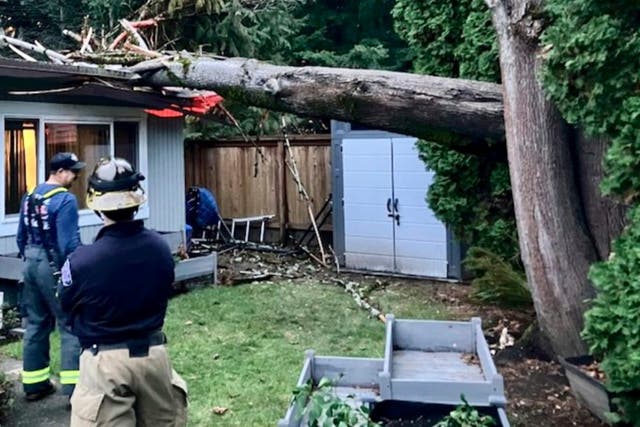
At least one person has died after a major storm swept across the north-west US, battering the region with strong winds and rain and causing widespread power outages.
The US Weather Prediction Centre warned of excessive rainfall through until Friday and hurricane-force wind warnings are in effect as the strongest atmospheric river – a large plume of moisture – that California and the Pacific North-west has seen this season overwhelms the region.
The storm system is considered a “bomb cyclone”, which occurs when a cyclone intensifies rapidly.
Downed trees have struck homes and littered roads across north-west Washington.

In Lynnwood, Washington, a woman died on Tuesday night when a large tree fell on a homeless encampment, South County Fire said in a statement on X.
In Seattle, a tree fell onto a vehicle, temporarily trapping a person inside, the Seattle Fire Department reported. The agency later said the individual is in stable condition.
“Trees are coming down all over the city and falling onto homes,” the fire department in Bellevue, about 10 miles east of Seattle, posted on the social platform X.
“If you can, go to the lowest floor and stay away from windows. Do not go outside if you can avoid it.”
Early Wednesday, more than 600,000 houses in Washington State were reported to be without power on poweroutage.us.
But the number of outage reports fluctuated wildly throughout the evening likely due in part to several weather and utility agencies struggling to report information on the storm because of internet outages and other technical problems.
It was not clear if that figure was accurate. More than 15,000 had lost power in Oregon and nearly 19,000 in California.
For those of you on the west coast: During high winds, trees can become dangerous objects. Stay safe by avoiding exterior rooms and windows and by using caution when driving. Prevent damage to your property by trimming loose branches and parking away from trees.… pic.twitter.com/Ue8IZJGMl6
— National Weather Service (@NWS) November 20, 2024
As of 8pm, the peak wind speed was in Canadian waters, where gusts of 101mph were reported off the coast of Vancouver Island, according to the National Weather Service in Seattle.
Along the Oregon coast, there were wind gusts as high at 79mph on Tuesday evening, according to the National Weather Service in Medford, Oregon, while wind speed of 77mph was recorded at Mount Rainier in Washington.
Winds were expected to increase in western Washington throughout the evening, the weather service said.
The US National Weather Service warned people on the West Coast about the danger of trees during high winds, posting on X: “Stay safe by avoiding exterior rooms and windows and by using caution when driving”.
In northern California, flood and high wind watches were in effect, with up to 8in of rain predicted for parts of the San Francisco Bay Area, North Coast and Sacramento Valley.
A 945 mb low pressure system continues to churn about 300 miles west of the Olympic Peninsula per the coordinated 00z (4 pm PST) surface analysis with @NWSOPC. Heavy rain, gusty winds, and mountain snow will continue across the Northwest through tomorrow as the system weakens. pic.twitter.com/lexILCNAk8
— NWS Weather Prediction Center (@NWSWPC) November 20, 2024
Dangerous flash flooding, rock slides and debris flows were expected, according to the National Weather Service Weather Prediction Centre.
A winter storm watch was issued for the northern Sierra Nevada above 3,500 feet (1,066 meters), where 15in of snow was possible over two days. Wind gusts could top 75mph in mountain areas, forecasters said.
The National Weather Service issued a flood watch for parts of southwestern Oregon through until Friday evening, while rough winds and seas halted a ferry route in north-western Washington between Port Townsend and Coupeville.
A blizzard warning was issued for the majority of the Cascades in Washington, including Mount Rainier National Park, starting on Tuesday afternoon, with up to a foot of snow and wind gusts up to 60mph, according to the weather service in Seattle. Travel across passes could be difficult if not impossible.


Why are you making commenting on The National only available to subscribers?
We know there are thousands of National readers who want to debate, argue and go back and forth in the comments section of our stories. We’ve got the most informed readers in Scotland, asking each other the big questions about the future of our country.
Unfortunately, though, these important debates are being spoiled by a vocal minority of trolls who aren’t really interested in the issues, try to derail the conversations, register under fake names, and post vile abuse.
So that’s why we’ve decided to make the ability to comment only available to our paying subscribers. That way, all the trolls who post abuse on our website will have to pay if they want to join the debate – and risk a permanent ban from the account that they subscribe with.
The conversation will go back to what it should be about – people who care passionately about the issues, but disagree constructively on what we should do about them. Let’s get that debate started!
Callum Baird, Editor of The National
Comments: Our rules
We want our comments to be a lively and valuable part of our community - a place where readers can debate and engage with the most important local issues. The ability to comment on our stories is a privilege, not a right, however, and that privilege may be withdrawn if it is abused or misused.
Please report any comments that break our rules.
Read the rules here